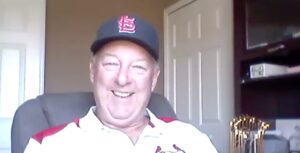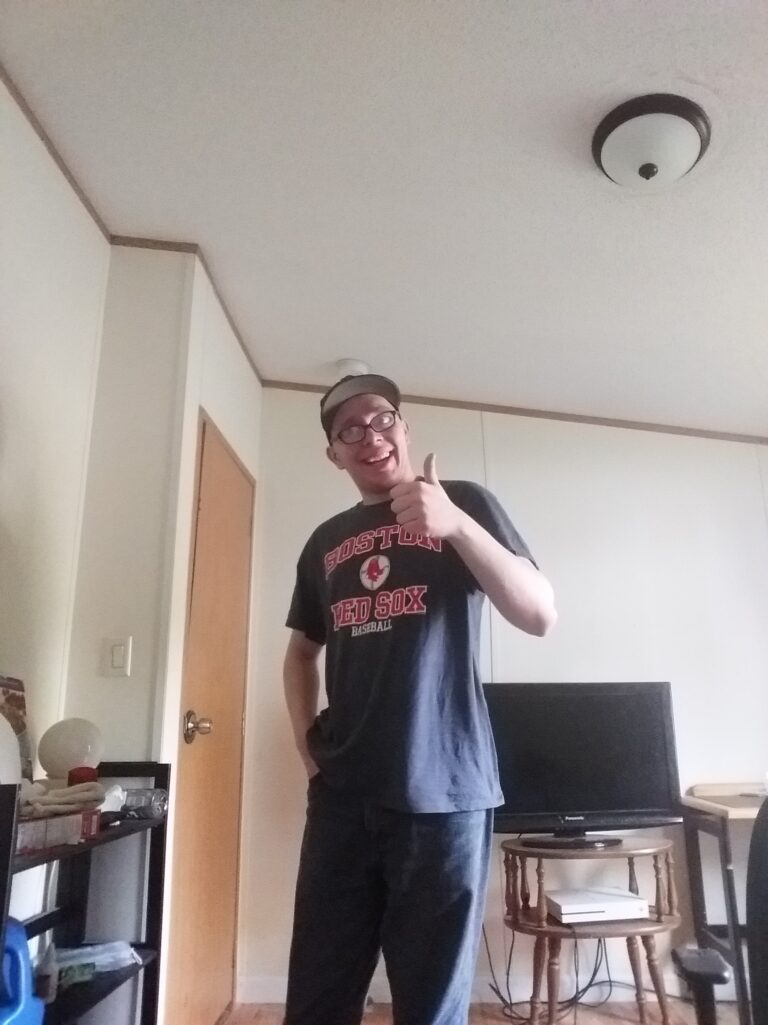Retired Major Leaguer visits Journalism Class

Retired Major League pitcher Dave LaPoint is already chatting with students as they trickled in to their 9 a.m. Intro to Journalism Zoom class on Sept. 11.
He’s talking about the fan mail that he gets, and how he feels obligated to reply to every letter.
“It’s absolutely bad karma if I don’t sign ‘em and send ‘em back,” LaPoint said.
As a retired player who is also retired from coaching, LaPoint gets most of his involvement in baseball from the St Louis Cardinals Fantasy Camp, which was cancelled this year due to the pandemic.
But he looks forward to the upcoming years of Fantasy Camp with excitement.
“In January of 2022, they are taking the whole year and honoring the 1982 Cardinals, which I was a part of, and happened to get this ring,” said LaPoint, holding his championship ring up to the camera. “They don’t hand those out to everybody, you know.”
He said Fantasy Camp is the “most fun thing” he’s done since he quit playing baseball.
“Believe it or not, I have to go down to Florida and make fun of people and get paid for it. That’s a good job,” LaPoint said with a laugh.
But getting out on the field again and making fun of people aren’t the only benefits of Fantasy Camp.
“You cannot believe the connections that you make and the friendships – I mean I’ve been doing it 16 years now and there’s guys that have been to every camp for 16 years,” LaPoint said.
LaPoint played on 11 teams during his career, including the Cardinals, which he revealed as his favorite when asked by student Jana DeCamilla.
“They love their baseball, and when you go into downtown St. Louis, it’s a sea of red, just people walking around all weekend can’t wait to shake your hand and meet you,” LaPoint said.
His least favorite team is the Phillies.
“They’re the only stadium that has ever booed Santa Claus, and they actually have a jail for when they arrest so many people during the pregame shows,” said LaPoint, with a laugh that spread to the students.
Sophomore River Willman wanted to know what it’s like to play for a professional team.
“It’s kind of like if you remember a scene in the Godfather during the funeral, you know the one that comes up to talk to you and befriend you is your enemy,” LaPoint said.
Seeking to clarify his strong analogy, he shared the story of how a fellow left-handed pitcher was talking to another pitcher but didn’t want LaPoint there, so he sent LaPoint off with a baseball to practice something called a “change-up pitch.”
“Well 20 minutes later I came back and I had one of the best change-ups in the history of baseball. And guess whose job I replaced when I learned how to throw this pitch? The guy that didn’t want me in the conversation,” LaPoint said.
He earned quite a few laughs from the class at that. He then went on to chat more about the life of a major leaguer and the comradery.
“It works out funny but, when you get to the Major Leagues, now it’s everybody pulling from the same end of the rope and you do anything possible for your team to win,” LaPoint said. “When we won in ’82 we had six rookies on our team, so we didn’t know if we were doing it right or we were doing it wrong.”
He was asked about the most memorable moments in his career by Anna DiFiore and he wasted no time in reminding the class of his World Series win.
“Well, winning the World Series is why we put a glove on when we’re 5,” he said, and then talked for some time about their win in 1982.
But another special moment for him was the experience of finally being a Major League player. He remembers his name being called on the opening lineup, having more money in his pocket than he’d ever had before, and especially having his own uniforms hanging in the locker.
“When you make it out of spring training, you have three brand new uniforms tailored for you and it’s got your name in it and everything like that and that means you’ve made the Major Leagues,” LaPoint said.
LaPoint told the class he’d wanted to be a baseball player since he was five, in response to student Brooke Rubright’s question of whether he’d always known he wanted to play professionally.
“As soon as I could put a glove on, I had a glove on,” LaPoint said.
His dad played baseball and so did his older brother, so it was an integral part of their family. Hoping never to let his dad down, he ended up breaking all of his baseball records in high school.
He also had the advantage of playing with his older brother and their friends when they would have “sandlot” games.
“I was that little brother that they would come and pull by the hair saying ‘come on, youre going to play baseball,’” said LaPoint, claiming it gave him an edge over the other players his age because he was ahead of the curve.
Because he always knew he would play baseball, he never gave himself a backup plan, an answer generated from a question by student Katheryn Rheaume.
“I was one of kids that I was just so in love with the game and that’s what I was gonna be that I never looked for collateral damage, my eyes were always straight ahead,” he said. “So therefore, I was very lucky.”
Student Jana DeCamilla wanted to know more about LaPoint’s post-baseball life, and asked about how he stumbled into owning Pitchers, a bar in Glens Falls, New York.
He said he came back to the area in 1995, and the opportunity presented itself. It was different from what he’d done before, having only played and coached baseball, but he loved it.
“I still love oldies music and classic rock and I don’t think I’ve gotten out of the eighties with music, and I’m okay with that,” LaPoint said, adding that the juke box was packed with oldies and said old friends loved to go there to chat baseball and old times.
But Sam Timpanaro was more curious about his experience managing a local baseball team called the Adirondack Lumberjacks in Glens Falls. He described how they started out with nearly nothing.
“When we opened the doors there was one folding metal chair inside the office, so we didn’t have any computers, we didn’t have any employees, we didn’t have any players, we didn’t have any uniforms, we didn’t have any equipment to take care of the field, so everything started from a broom-swept floor. There was nothing there, and it was probably the most fun I’ve had in my life,” LaPoint said.
As for his work ethic, LaPoint believes it’s intrinsic. Anna Paynter has asked if baseball impacted that at all.
“I don’t know if what you do affects your work ethic, I think that’s born in you from day one,” LaPoint said. He said he remembers having a “winning mentality” from an early age.
“I was a Dallas Cowboys fan as football, and when I was a kid they lost a game in the playoffs, and I think I missed two days of school ‘cause I was crying so bad, that’s how much of a fan I was,” LaPoint said.
When he was older, and preparing for the Major Leagues, he would work out five times a day, running three to five miles in the snow if it was wintertime.
“You try to put fun into it, because it was a lot of hard work and a lot of pain but if you just keep your eyes on the prize it seems to make it go by a little bit quicker,” LaPoint said.
But it was all worth it when he made it to the Major Leagues.
He said that joining the Major Leagues and meeting your idols wasn’t what he expected it to be, after Heather Paradis asked about any specific players or coaches he looked up to.
He remembers being in the minor leagues and not doing well on his first few games, and he describes the coach walking out to the mound.
“He goes up to me and he goes ‘David, I don’t think you can get an effin’ out,” said LaPoint, “I didn’t get to pick up a ball for the next two weeks.”
He also recalled the players he looked up to as a teen.
“My favorite player of all time is a guy named Willy Mays and he is the only guy in baseball that I have never met,” he said.
But there were some players he idolized that he did get to play with, and got to know very well. He looked up to Vida Blue and Catfish Hunter and ended up playing with both of them.
“Kind of a weird situation where you know you actually are standing side by side with all of these people you idolize,” LaPoint said.
He recalled meeting a group of players one time when he was with the Yankees, and was wondering how he could impress them.
Famous Yankee pitcher Whitey Ford told him, “Buy us a 12-pack of beer at the bar later and we’ll all be your friends.”
LaPoint emphasized that friendship was a vital aspect of baseball, and the friendships he made were long lasting.
“You know, it’s not that tough to be nice. And you get a lot more success out of being nice than if you go the other direction,” he said.








